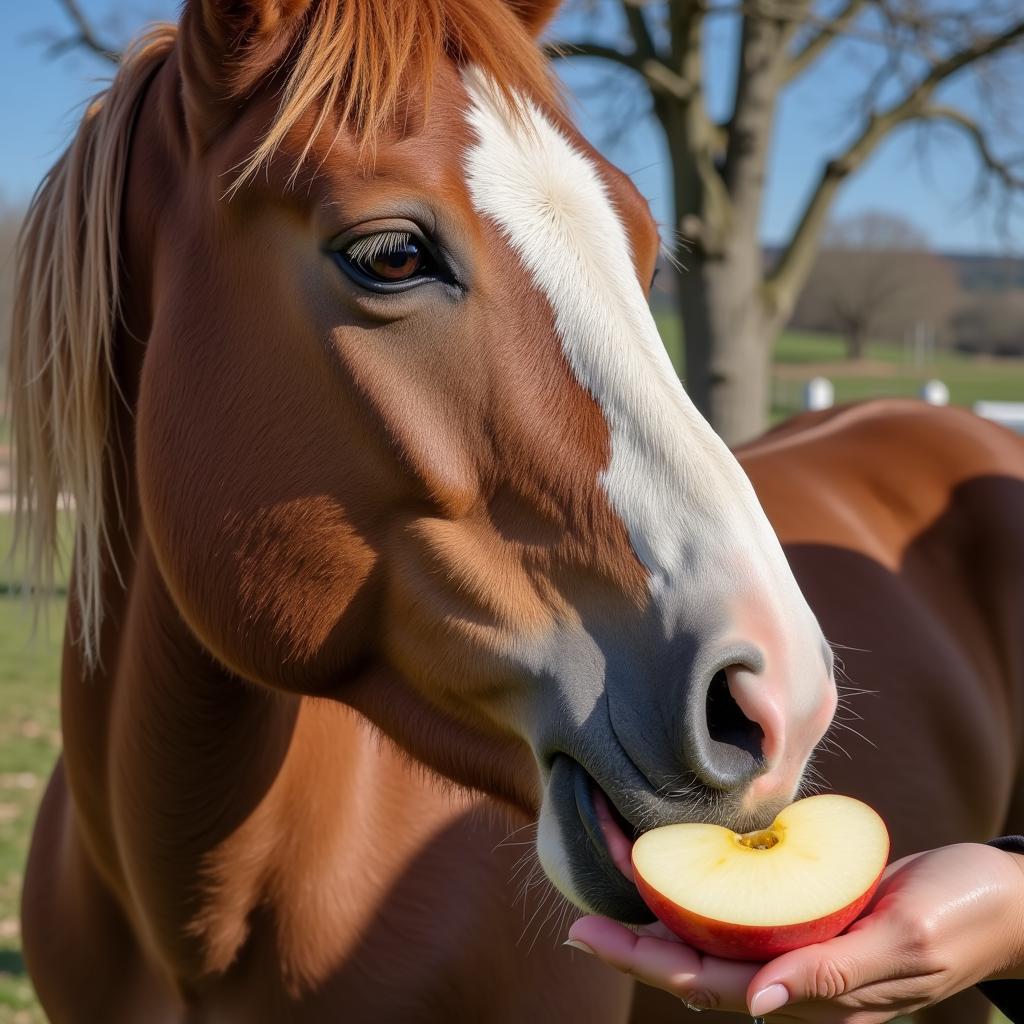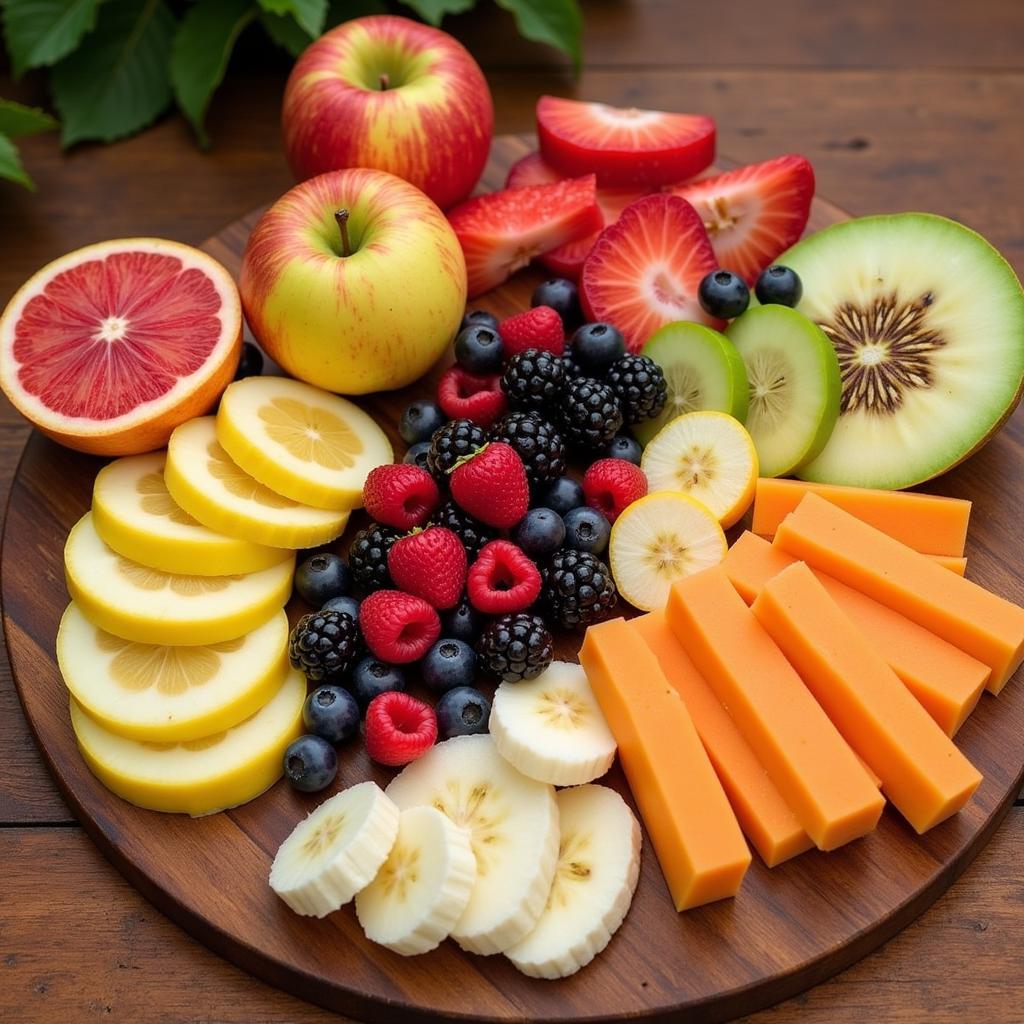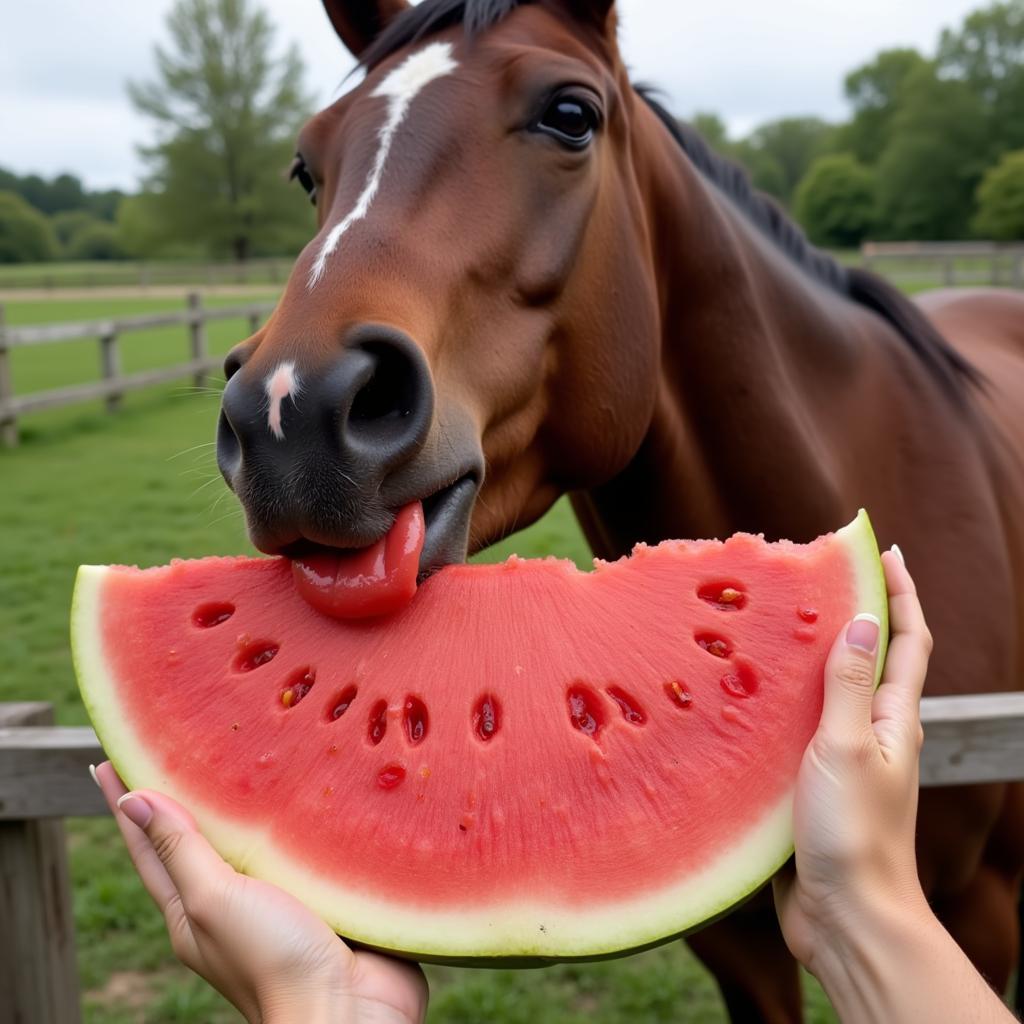Horses can enjoy a variety of treats in addition to their regular diet of hay and pasture. Fruits, in particular, are a delicious and healthy option that can provide your horse with essential vitamins, minerals, and antioxidants. However, it’s crucial to know which fruits are safe for horses to consume and in what quantities. This comprehensive guide will delve into the world of Fruits Horses Can Eat, ensuring you can treat your equine companion safely and responsibly.
Understanding a Horse’s Digestive System
Horses have a unique digestive system specifically designed to process large amounts of forage. Their stomachs are relatively small compared to their body size, and their intestines are long and complex. This means that horses digest food slowly through fermentation, which allows them to extract nutrients from fibrous plant material.
While fruits are a natural part of a horse’s diet in the wild, it’s important to remember that domesticated horses are often fed a more controlled diet consisting mainly of hay, grain, and supplements. Introducing fruits should be done in moderation to avoid digestive upset.
 Horse Eating Apple from Hand
Horse Eating Apple from Hand
Safe and Tasty Fruits for Your Horse
Many fruits are safe and enjoyable treats for horses when fed in moderation. Here are some popular choices:
- Apples: A classic favorite, apples are a great source of vitamins A and C, as well as fiber. Remove the core and seeds before feeding, as these contain trace amounts of cyanide.
- Bananas: Rich in potassium, bananas can be a healthy treat for horses, especially those who experience muscle fatigue. Offer bananas in moderation due to their high sugar content.
- Berries: Strawberries, blueberries, raspberries, and blackberries are all safe for horses and packed with antioxidants. These can be fed fresh, frozen, or dried.
- Melons: Watermelon, cantaloupe, and honeydew melon are all hydrating treats that horses tend to enjoy, especially during warmer months.
 Assortment of Horse-Friendly Fruits
Assortment of Horse-Friendly Fruits
- Peaches and Plums: Stone fruits like peaches and plums can be offered as an occasional treat but make sure to remove the pits, which contain cyanide.
- Mangoes: This tropical fruit is safe for horses in moderation. Remove the skin and pit before feeding.
Fruits to Avoid Feeding Your Horse
While many fruits are safe for horses, some should be avoided due to potential health risks. These include:
- Avocado: All parts of the avocado plant contain persin, a toxin that can cause colic and even death in horses.
- Tomatoes: Tomatoes belong to the nightshade family and contain solanine, which can be toxic to horses in large quantities.
- Onions and Garlic: While not technically fruits, it’s important to mention that onions and garlic are highly toxic to horses and can cause anemia.
Introducing Fruits to Your Horse’s Diet
When introducing any new food to your horse’s diet, it’s essential to do so gradually. Start with small quantities and observe your horse for any signs of digestive upset, such as loose stool, colic, or changes in appetite.
It’s also crucial to wash all fruits thoroughly before feeding to remove any dirt, pesticides, or residues. Cutting fruits into smaller pieces can help prevent choking hazards, especially for horses prone to bolting their food.
 Horse Enjoying Watermelon Treat
Horse Enjoying Watermelon Treat
Listening to Your Horse
Every horse is different, and what one horse enjoys, another may not. Pay attention to your horse’s preferences and reactions when introducing new fruits. If you notice any adverse effects, discontinue feeding that particular fruit and consult with your veterinarian.
Conclusion
Offering a variety of fruits as treats can enrich your horse’s diet and provide valuable nutrients. Remember to introduce fruits slowly, feed them in moderation, and always prioritize your horse’s health and well-being. By following these guidelines, you can safely share the joy of fruit with your equine companion.
FAQs
Can horses eat the skin of fruits?
It’s generally best to peel fruits before feeding them to horses. While the skin of some fruits may not be harmful, it can be harder to digest and may contain pesticide residues.
How many fruits can I give my horse in a day?
Treats, including fruits, should not exceed 10% of your horse’s daily caloric intake. Offer fruits sparingly, aiming for a few small pieces per day.
Can I give my horse fruit every day?
While it’s fine to offer fruits regularly, it’s best to do so in moderation and as part of a balanced diet.
What should I do if my horse shows signs of digestive upset after eating fruit?
If you notice any signs of colic, diarrhea, or other digestive issues, discontinue feeding fruits and contact your veterinarian immediately.
Where can I find more information about horse nutrition?
For more information about safe and healthy treats for horses, check out our articles on apple treats for horses and can horses eat banana peel.
Need help finding the right treats for your horse?
Contact us at Phone Number: 0772127271, Email: [email protected] or visit our location at QGM2+WX2, Vị Trung, Vị Thuỷ, Hậu Giang, Việt Nam. Our dedicated customer support team is available 24/7 to assist you.